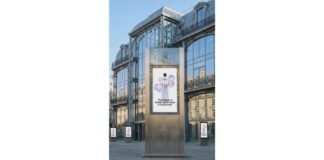For those who have a little contact with the history of art, fashion and photography, the weird posing immediately reminds us of Bourdain.
Guy Bourdain, whose works are exhibited in prestigious museums around the world, including New York’s MoMA, the Victoria & Albert Museum, the Victoria & Albert Museum and the Museum of Fine Arts. Albert Museum, the Jeu de Paume, the Tokyo Metropolitan Museum of Photography, the National Art Museum of China and the Moscow House of Photography, was born in Paris in 1928, and discovered his vocation and love of photography as a child.
The French artist presented his works to the public in 1952 at Galerie 29 in Paris, while in 1954 he began working with French Vogue, having already collaborated with some of the world’s biggest magazines, such as Harper’s Bazzar, as well as with international fashion houses such as Chanel, Ungaro and Charles Jourdan. It is obvious that his career was on the upswing as soon as it appeared.
Some of the most famous images of the photographer, who dared to reject all the photographic standards of the time, breaking the norms and traditions of his time, depict mannequins with their legs cut off just below the knee.
The professor of fashion history at Central Saint Martins College of Arts and Design in London, Alistair O’Neill, previously discussing Bourdain’s life and work in the Guardian, had stated that these legs were “so exquisitely placed that you could see almost the whole woman – that’s how strong the sensation was”.
In fact, the French-born artist was meticulous in planning his photographs, sketching the composition and searching for positions beforehand, with the end result looking extremely effortless nonetheless.
He was inspired by the surrealist movement and more specifically by the work of Man Ray, but by questioning the choices made by photographers up to that point, he managed to find his own identity and create his own current in the field of art and photography. Humour was one of his main tools, and he had no interest in perfection.
It was no coincidence, then, that the media of the time described Guy Bourdin as an inventor.
Like contemporary French New Wave directors, Bourdin admired Hitchcock and was fascinated by the director’s idea of the “Macguffin”, the inanimate, often inexplicable object that catalyses the plot of a thriller.
In Bourdain’s world the “Macguffin” could be rendered as a giant high heeled yellow shoe, placed in a mysterious hotel corridor, waiting to be polished by the black arms of the men surrounding it.
Possessing a painter’s perspective, Bourdain, with both black and white and brightly coloured images, created incredible stories and compositions, leaving his own unique mark on both commercial and fashion photography. Of course its impact is still felt today.

